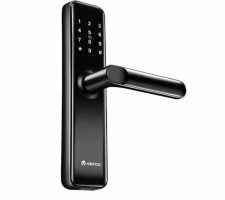In an era characterized by rapid technological advancements and an ever-growing emphasis on convenience and security, the evolution of traditional locks has paved the way for an innovative and transformative solution: digital smart lock. These cutting-edge marvels have not only revolutionized the way we secure our spaces but have also redefined the very concept of access control. As we stand on the cusp of a new era, exploring the vast landscape of digital smart lock advancements offers a glimpse into the future of security.
Digital smart locks encompass a wide array of features that combine security, convenience, and connectivity. At their core, they eliminate the need for physical keys and introduce a range of methods to unlock doors. Whether through biometric recognition, such as fingerprints or facial scans, or digital credentials like smartphone apps and keycards, these locks provide an unprecedented level of flexibility for users to choose the method that suits them best.

One of the primary advantages of digital smart locks lies in their ability to enhance security through advanced authentication methods. Biometric recognition, for instance, ensures that only authorized individuals can gain access, as each person’s biometric data is unique and virtually impossible to replicate. This not only minimizes the risk of unauthorized entry but also eliminates concerns associated with lost or stolen keys.
Beyond security, digital smart locks have tapped into the realm of connected living. Many of these locks can be integrated into existing smart home ecosystems, allowing homeowners to control access remotely through their smartphones. This connectivity paves the way for features such as remote unlocking for guests, temporary access for service providers, and real-time access logs that provide insights into who entered the premises and when.
The potential applications of digital smart locks extend far beyond residential spaces. They have been embraced by commercial enterprises, where controlling access to offices, warehouses, and sensitive areas is of paramount importance. The ability to manage access levels for different employees and monitor entry activity in real-time empowers businesses to streamline their security measures while maintaining a seamless flow of operations.
Singapore, known for its penchant for innovation and technological prowess, has embraced digital smart lock advancements with open arms. The city-state’s urban landscape is characterized by modern living and smart infrastructure, making it a natural fit for these cutting-edge solutions. From high-rise condominiums to commercial complexes, digital smart locks have found their place in enhancing security and convenience in various settings.
As the market for digital smart locks continues to evolve, manufacturers and providers are constantly pushing the boundaries of innovation. Sleek and futuristic designs, coupled with user-friendly interfaces, are becoming the norm. Additionally, ongoing research and development are resulting in features like voice recognition, gesture-based access, and even integration with artificial intelligence systems for predictive security measures.



